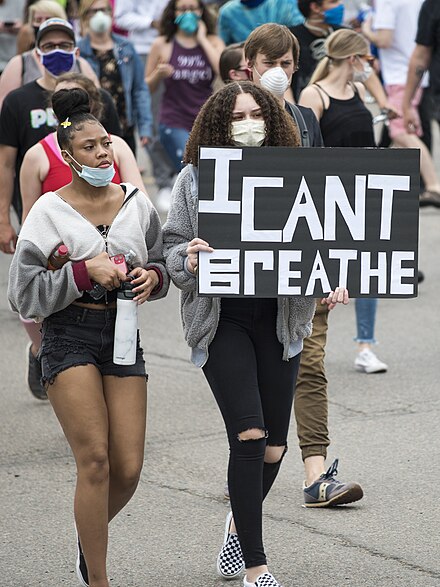From Truthout

Protest against police violence
(Image by Wikipedia (commons.wikimedia.org), Author: Fibonacci Blue) Details Source DMCA
On June 28, United Nations High Commissioner for Human Rights Michelle Bachelet released a stunning 23-page report accompanied by a 95-page conference room paper for the UN Human Rights Council (HRC) documenting systemic racism and human rights violations by police forces against Africans and people of African descent throughout the world. The report considered more than 340 interviews and more than 100 written submissions from civil society organizations.
Bachelet grounded her analysis in "the long-overdue need to confront the legacies of enslavement, the transatlantic trade in enslaved Africans and colonialism and to seek reparatory justice." She took aim at "misconceptions that the abolition of slavery, the end of the transatlantic trade in enslaved Africans and colonialism" and subsequent reforms have eliminated "the racially discriminatory structures built by those practices and created equal societies."
The report finds:
- The dehumanization of people of African descent a practice rooted in false social constructions of race created to justify enslavement, pervasive racial stereotypes and widely accepted harmful practices and traditions has sustained and cultivated a tolerance for racial discrimination, inequality and violence, which continues to have a disproportionate impact on the enjoyment of their human rights.
"Systemic racism needs a systemic response," Bachelet wrote. "States should adopt a systemic approach to combating racial discrimination through the adoption and monitoring of whole-of-government and whole-of-society responses." They should be designed "to dismantle systemic racism."
Hailing the report as "a victory," the U.S. Human Rights Network (USHRN) issued a statement saying it "reflects the efforts of civil society to educate UN officials about human rights violations and the peoples' solutions ... even convening a peoples' commission of inquiry to take on what the UN declined to do last year."
After the killing of George Floyd and subsequent mass protests, the USHRN and the ACLU organized an international coalition that urged the HRC to establish a commission of inquiry to investigate systemic racism and police violence against people of African descent in the United States. Instead, on June 19, 2020, after intensive lobbying by the Trump administration, the HRC adopted resolution 43/1, directing the High Commissioner to prepare a report on police violence and other human rights violations against Africans and people of African descent around the world (not limited to the United States).
Thus, the International Association of Democratic Lawyers, National Conference of Black Lawyers and National Lawyers Guild established their own International Commission of Inquiry on Systemic Racist Police Violence Against People of African Descent in the United States. The commission issued its report on April 15, 2021. I served as one of four rapporteurs who assisted the 12 commissioners in drafting our 188-page report, which Bachelet cited in her report and conference room paper.
Systemic Racism, Denial and Impunity"The worldwide mobilization of people calling for racial justice has forced a long-delayed reckoning with racism and shifted debates towards a focus on the systemic nature of racism and the institutions that perpetrate it," Bachelet wrote.
Bachelet's report indicts the cultures of systemic racism, denial and impunity of law enforcement officials for violating the human rights of people of African descent. She lays blame for "the racialization of poverty" at the feet of insufficient meaningful participation of people of African descent in decision making and impediments to their right to vote. Bachelet charges that "the dehumanization of people of African descent" is "rooted in false social constructions of race historically created to justify enslavement, pervasive racial stereotypes" and false narratives that associate people of African descent with criminal activities.
Discriminatory identity checks and stops -- and -- searches are attributable to racial profiling, according to Bachelet, and she condemns disproportionate stops, arrests and imprisonment for drug-related offenses.
Bachelet's analysis of 190 cases globally (most from the United States) revealed that at least 85 percent of police-related deaths could be attributed to: (1) policing of minor offenses, traffic stops and stops-and-searches (such as the case of George Floyd); (2) intervention of police as first responders to mental health crises; and (3) special police operations (like the case of Breonna Taylor). Many of the victims did not pose an imminent threat of death or serious injury to justify lethal force under international legal standards.
Citing our commission report, Bachelet decries the militarization of law enforcement, including the deployment of military personnel and equipment, which often leads to "a rapid escalation in the use of force" particularly "in the context of the war on drugs."
She also cites our commission report's analysis that the lack of clarity in use-of-force laws about obligations under international human rights law increases the risk of violations and poses an impediment to accountability.
(Note: You can view every article as one long page if you sign up as an Advocate Member, or higher).





